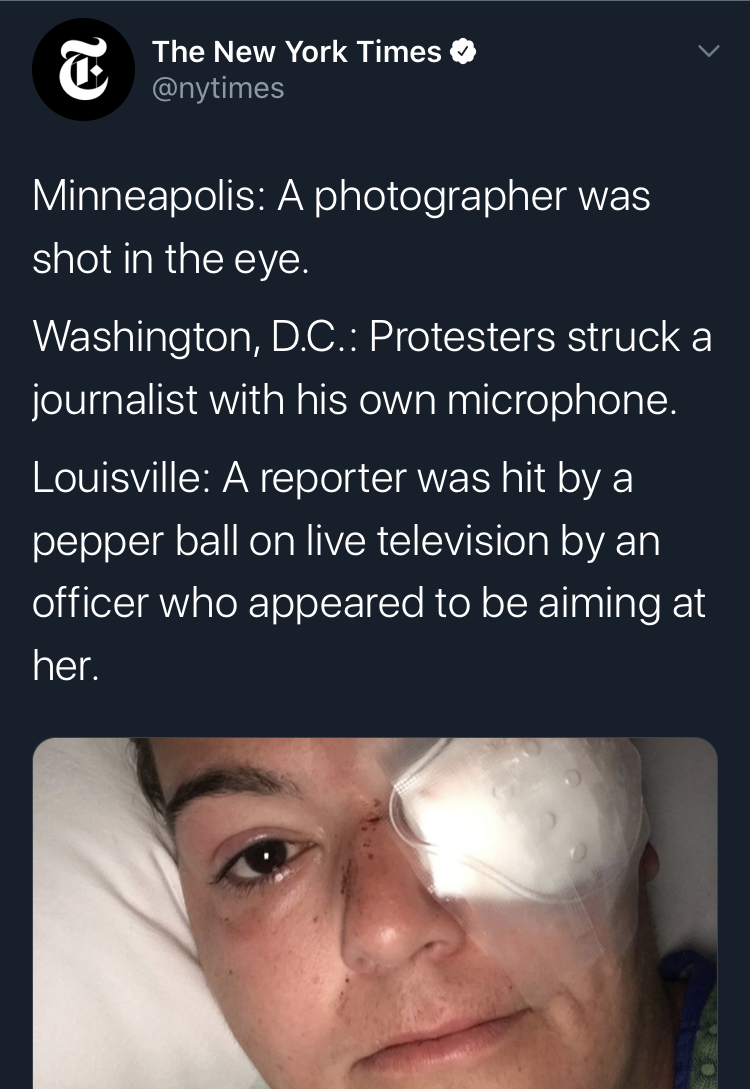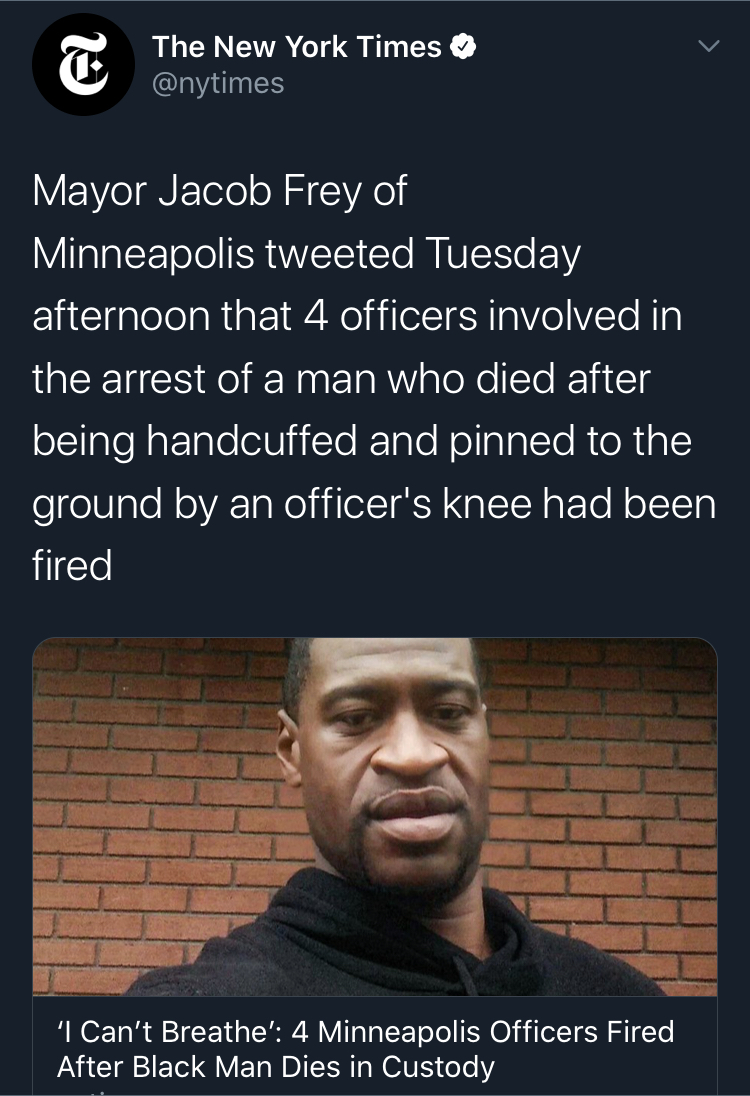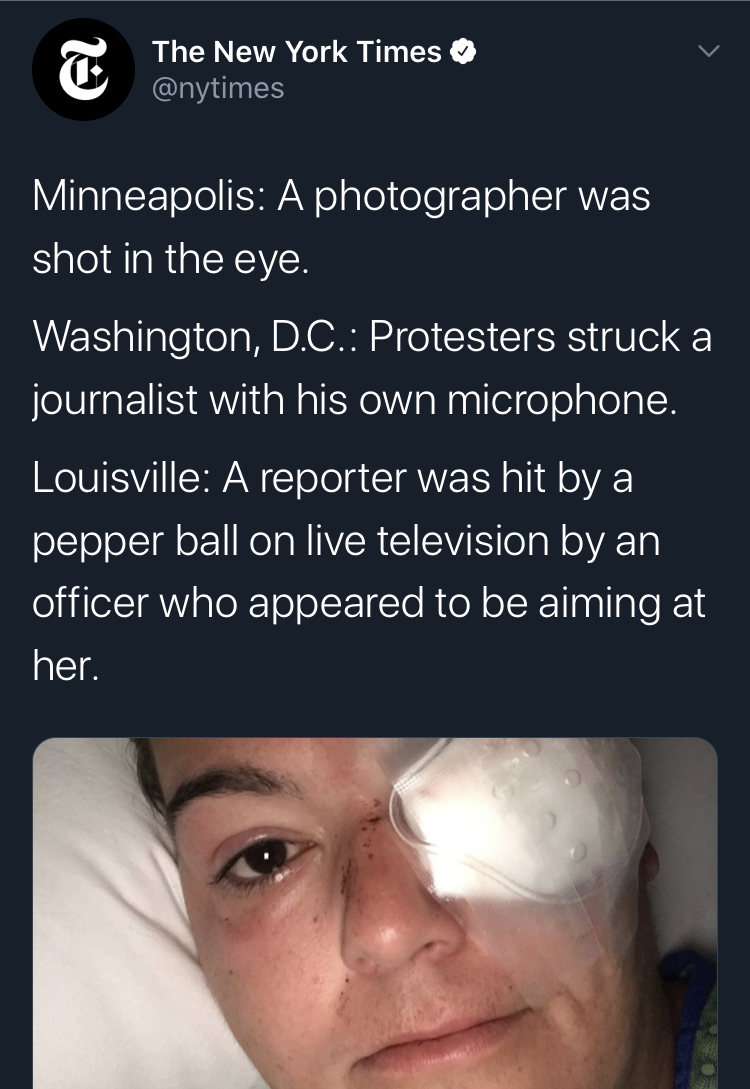Want to use these tweets from NYT to explain active vs passive voice and why it matters in news coverage (particularly when covering charged topics at the moment).
A sentence typically has a clear subject and verb. When you write a a sentence, you can write in active or passive voice.
Active voice is subject then verb. An example is "I fixed the car."
Passive is an inversion of this ie. "The car was fixed by me."
Active voice is subject then verb. An example is "I fixed the car."
Passive is an inversion of this ie. "The car was fixed by me."
There are levels of active and passive voice, particularly relating to the subject and verb. Examples:
Joshua sliced an apple
A man sliced an apple
An apple was sliced by Joshua
An apple was sliced by a man
An apple was sliced
The slicing of an apple was by a man
Joshua sliced an apple
A man sliced an apple
An apple was sliced by Joshua
An apple was sliced by a man
An apple was sliced
The slicing of an apple was by a man
The subject of the sentence is the most important part, and usually comes at the beginning. When it comes at the end, our brain is less likely to register it as important as it is.
In public relations, they will tell you that when you did something good, make it active; are doing damage control, write in passive voice. Active voice takes ownership (someone did something) while passive voice makes ownership more nebulous (something was done by someone).
It distances the wrong thing away from the subject. This is because passive voice makes the direct object the subject in the technical sense (even if it is not the subject in the literal sense), which makes the meaning of the sentence blurry.
When news org write headlines, they "should" stay in active voice. It& #39;s generally more objective, it& #39;s reporting in the traditional sense and gives the reader a clear understanding of what happened (who what where when why how).
However, journalists are very conscious of the power of language and make choices about whether they will assume active or passive voice. They know that, unfortunately, active voice can have an accusatory connotation, even if it is literally only the reporting of facts.
So when they are writing about things that reflect negatively on certain institutions or people (the state, police, etc.), they may feel compelled to write in passive voice.
Example:
"A village in Afghanistan was demolished after an airstrike the US took part of"
Example:
"A village in Afghanistan was demolished after an airstrike the US took part of"
Make sure to pay attention when you see news outlets write in passive voice. They are making very subtle value judgements. Let& #39;s look at these tweets as examples.
In the tweet on the left, the writer of this tweet choose to use passive verbs like "involved in the arrest" and "died." If you fought someone, for example, would you say "I was involved in a fight with Joshua." No, you& #39;d say "I fought Joshua." Also, the office killed this man.
An active way to write this sentence would have been "Mayor Jacob Frey of Minneapolis tweeted Tuesday afternoon that 4 officers had been fired after one killed a man from pinning his knee on the man& #39;s neck during an arrest."
In the tweet on the right, three things happened: a reporter was shot in the eye, protestors struck a journalist, a reporter was hit by a pepper ball. Looking at the sentence in the middle, we know who did what. This is an active sense.
However, looking at the top and bottom, who is person who committed this violence? Technically, we don& #39;t know. It just happened. The connotation is that it may be unknowable, particularly in a riot. It was a random crime in the chaos and cacophony of all that was going on.
If you read the news and you give this headline a quick glance, what clear "facts" would you take away? The only one would be that protestors beat a journalist. And since you don& #39;t know did the violence in the other two instances, you have to guess who.
Your guess is going to largely conform to your prior knowledge or bias. If you know that police have been committed some of this violence, you get a picture of both sides for this tweet.
However, if you tend to be more pro-police and are not privy to all the reporting, you likely may assume that all of the aforementioned violence was by protestors.
Note: It would be easy to say "Well people should read the article." I would say that& #39;s both fair and unfair. People should verify the news they read. But we are also being bombarded with new info every second of everyday.
News outlets have an ethical responsibility to make the news they report accurate and easy to understand to the common reader.
Adding race into it, as a generally knowledgeable news-consumer (I& #39;m a communication prof) and as a journalist, I very rarely see news outlets write about the crimes of black folk in passive voice. They are far more likely to write about the crimes of white folk in passive voice.
When writing about police officers killing unarmed black women and children, journalists common write in passive voice. I would argue that they have an ethical, professional, and moral obligation to remain in active voice. It& #39;s subtle but it& #39;s important.
*black men, women, and children
When journalists write about police violence in passive voice, but write about the violence of black people in active voice, they are making a value judgement. Don& #39;t overlook it and don& #39;t think "it isn& #39;t deep." It& #39;s a very subtle cultural commentary.
When news orgs write about police violence in passive voice, they are revealing (in a very subtle way) assessments about agency, guilt, and culpability. At the least, they have internalized subliminal culture understanding that "you don& #39;t write about those people in that way."

 Read on Twitter
Read on Twitter





